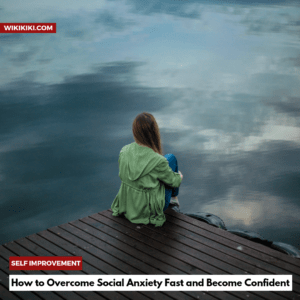Living with social anxiety can be incredibly challenging. The fear of judgment and rejection can make even the simplest social interactions overwhelming and anxiety-inducing. Social anxiety disorder can significantly impact a person’s daily life, making it difficult to engage in common activities such as talking with coworkers, buying groceries, eating in public, attending classes, or going on dates.
Also Read: Why Physically Fit People Experience Heart Attacks?

However, it’s important to remember that overcoming social anxiety is an achievable goal. In this comprehensive guide, we will explore effective strategies and techniques that can help you feel more comfortable in social situations and interact with others with greater ease.
Seek Professional Support
One of the first and most important steps in overcoming social anxiety is seeking professional support. Talking with a therapist who specializes in anxiety disorders can provide invaluable guidance and assistance throughout your journey. A therapist can help you:
- Understand the difference between social anxiety and shyness, helping you gain clarity about your specific challenges.
- Identify the triggers that provoke anxiety in social situations, allowing you to develop a better understanding of your anxiety’s underlying causes.
- Learn coping strategies, social skills, and relaxation techniques that can help you manage and alleviate your anxiety symptoms.
- Challenge and replace negative thoughts and beliefs that contribute to social anxiety through therapy sessions.
- Consider group therapy or support groups as additional resources for practicing social skills and receiving support from others who share similar experiences.
- Explore medication options if your symptoms are severe and significantly affecting your quality of life.
Identifying Triggers
Social anxiety manifests differently in each person. It is essential to explore specific situations that trigger anxiety and identify the underlying reasons behind them. By listing the situations that cause the most discomfort, such as job interviews or meeting new people, you can gain a clearer understanding of your anxiety triggers. Additionally, noting the physical symptoms you experience during these situations, such as lightheadedness or a racing heart, can help you develop effective coping mechanisms.
Also Read: Dopamine Detox: How to Boost Productivity using Dopamine Detox
Challenge Negative Thoughts
Negative thoughts and self-doubt often contribute to social anxiety. Learning to challenge and reframe these thoughts is a powerful tool in overcoming social anxiety. Here are some techniques to help you challenge negative thoughts:
- Engage in realistic thinking exercises. Ask yourself if your negative thoughts are based on facts or irrational beliefs.
- Recognize that your anxious predictions of negative outcomes are often exaggerated or unlikely to happen.
- Ask yourself critical questions to challenge anxious thoughts. For example, “What evidence do I have to support this negative belief?” or “Is there a more balanced or realistic way to interpret this situation?”
- Understand the spotlight effect, which is the tendency to believe that others are paying more attention to us than they actually are. Remind yourself that people are generally focused on themselves and are less likely to scrutinize your every move.
- Overcome the fear of judgment and rejection by gradually exposing yourself to social situations and realizing that the vast majority of people are supportive and accepting.
Start Small and Gradually Progress
Overcoming social anxiety is a gradual process, and it’s important to start small and take manageable steps. Begin by engaging in simple social interactions that feel less intimidating. For example, practice initiating conversations with acquaintances or ordering food at a restaurant. As you become more comfortable with these situations, gradually challenge yourself to tackle more complex social scenarios. By taking small steps and building upon your successes, you can develop the confidence and skills necessary to navigate social interactions with greater ease.
Role-Play and Practice Scenarios
Practicing social interactions with trusted friends or family members through role-playing can be incredibly beneficial. By simulating everyday conversations and scenarios, you can prepare yourself for potential challenges and develop effective communication strategies. For example, you can practice explaining what you’re looking for to a store clerk or responding to a correction without feeling embarrassed. This rehearsal helps you feel more prepared and confident when facing similar situations in real life.
Utilize Relaxation Techniques
Incorporating relaxation techniques into your daily routine can help calm your mind and body, reducing the intensity of social anxiety symptoms. Consider trying the following techniques:
- Deep breathing exercises: Take slow, deep breaths, focusing on inhaling and exhaling fully. This technique can help regulate your breathing and promote relaxation.
- Progressive muscle relaxation: Tense and then release each muscle group in your body, starting from your toes and working your way up to your head. This practice can help release tension and promote a sense of relaxation.
- Mindfulness meditation: Practice being present in the moment, observing your thoughts and feelings without judgment. Mindfulness meditation can help you develop a non-reactive and accepting mindset, reducing anxiety in social situations.
- Visualization: Imagine yourself successfully navigating a social situation and feeling calm and confident. Visualizing positive outcomes can help rewire your brain to associate social interactions with positive experiences.
Also Read: Unlocking the Benefits of Positive Psychology: Techniques for a Happier Life
Take Care of Yourself
Self-care plays a crucial role in managing social anxiety. Prioritize your physical and emotional well-being by:
- Getting enough sleep: Lack of sleep can contribute to heightened anxiety levels. Aim for a consistent sleep schedule and create a relaxing bedtime routine.
- Engaging in regular exercise: Physical activity releases endorphins, which can improve mood and reduce anxiety. Find an exercise routine that you enjoy and can incorporate into your schedule.
- Eating a balanced diet: Proper nutrition can impact your overall well-being and mental health. Aim to consume a variety of nutritious foods and stay hydrated.
- Limiting caffeine and alcohol intake: Both caffeine and alcohol can exacerbate anxiety symptoms. Monitor your consumption and consider reducing or eliminating these substances from your diet.
- Practicing stress management techniques: Engage in activities that help you relax and unwind, such as reading, listening to music, practicing yoga, or engaging in hobbies you enjoy.
Practicing Acts of Kindness
Performing small acts of kindness can help reduce social anxiety by fostering positive connections and earning approval from others. Engaging in thoughtful gestures like bringing a sick co-worker soup or helping a neighbor with their groceries can create positive associations with social interactions. As you receive positive feedback and gratitude from others, your self-confidence and belief in your social skills can grow. Acts of kindness also shift the focus away from yourself and onto helping others, which can alleviate anxiety and create a sense of purpose.
Joining Social or Hobby Groups
Joining social or hobby groups centered around activities you enjoy can provide a comfortable and structured environment for social interactions. Whether it’s a book club, a sports team, or a cooking class, being part of a group with a shared interest provides an immediate conversation topic and common ground. This can help alleviate the pressure of initiating conversations and foster connections with like-minded individuals who may become supportive friends.
Practicing Mindfulness
Mindfulness involves being fully present and aware of your thoughts, emotions, and sensations without judgment. By practicing mindfulness, you can learn to observe and accept your anxious thoughts and physical sensations without becoming overwhelmed by them. Mindfulness meditation and breathing exercises can help ground you in the present moment and reduce anxiety. Regular practice of mindfulness can increase self-awareness, reduce negative self-talk, and improve overall well-being.
Celebrate Progress and Be Kind to Yourself
Overcoming social anxiety is a journey that requires patience and self-compassion. Celebrate even the smallest victories and acknowledge the progress you make along the way. Be kind to yourself and remember that setbacks are a normal part of the process. Instead of dwelling on perceived failures, focus on what you have learned and how you can continue moving forward.
Conclusion
Overcoming social anxiety is a journey that requires patience, persistence, and self-compassion. By seeking professional support, identifying triggers, challenging negative thoughts, and starting with small steps, you can gradually build confidence in social situations. Role-playing scenarios, utilizing relaxation techniques, and practicing acts of kindness can further enhance your social skills and reduce anxiety. Joining social or hobby groups and practicing mindfulness can provide additional opportunities for growth and connection.
Remember, everyone has moments of self-doubt and social discomfort, but with time and practice, you can overcome social anxiety and cultivate meaningful relationships. Be kind to yourself, celebrate your progress, and don’t hesitate to seek support when needed. You have the strength to thrive socially and create a fulfilling life.
Also Read: How to Practice Self-Love: A Comprehensive Guide to Being Kind to Yourself



















+ There are no comments
Add yours